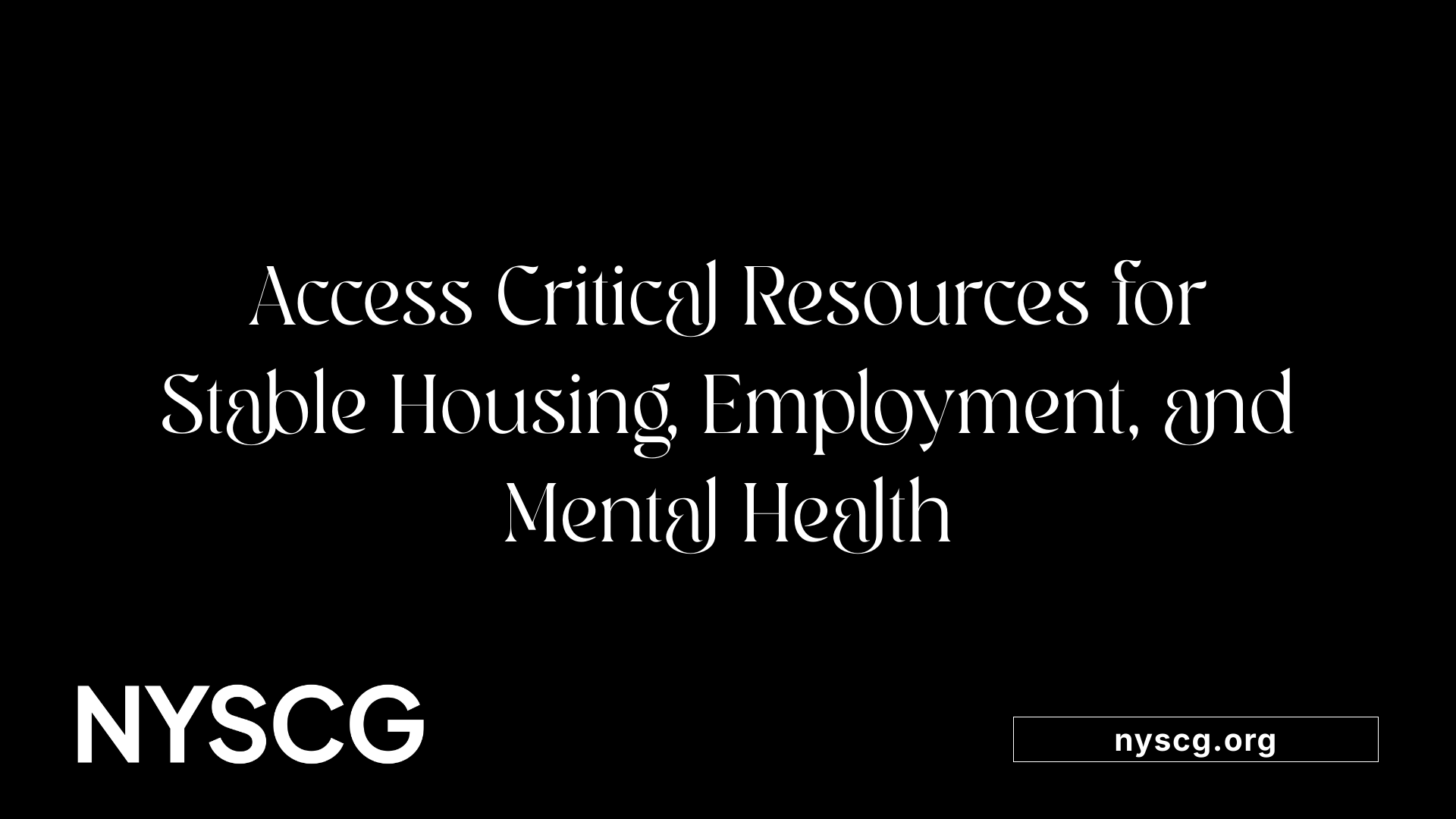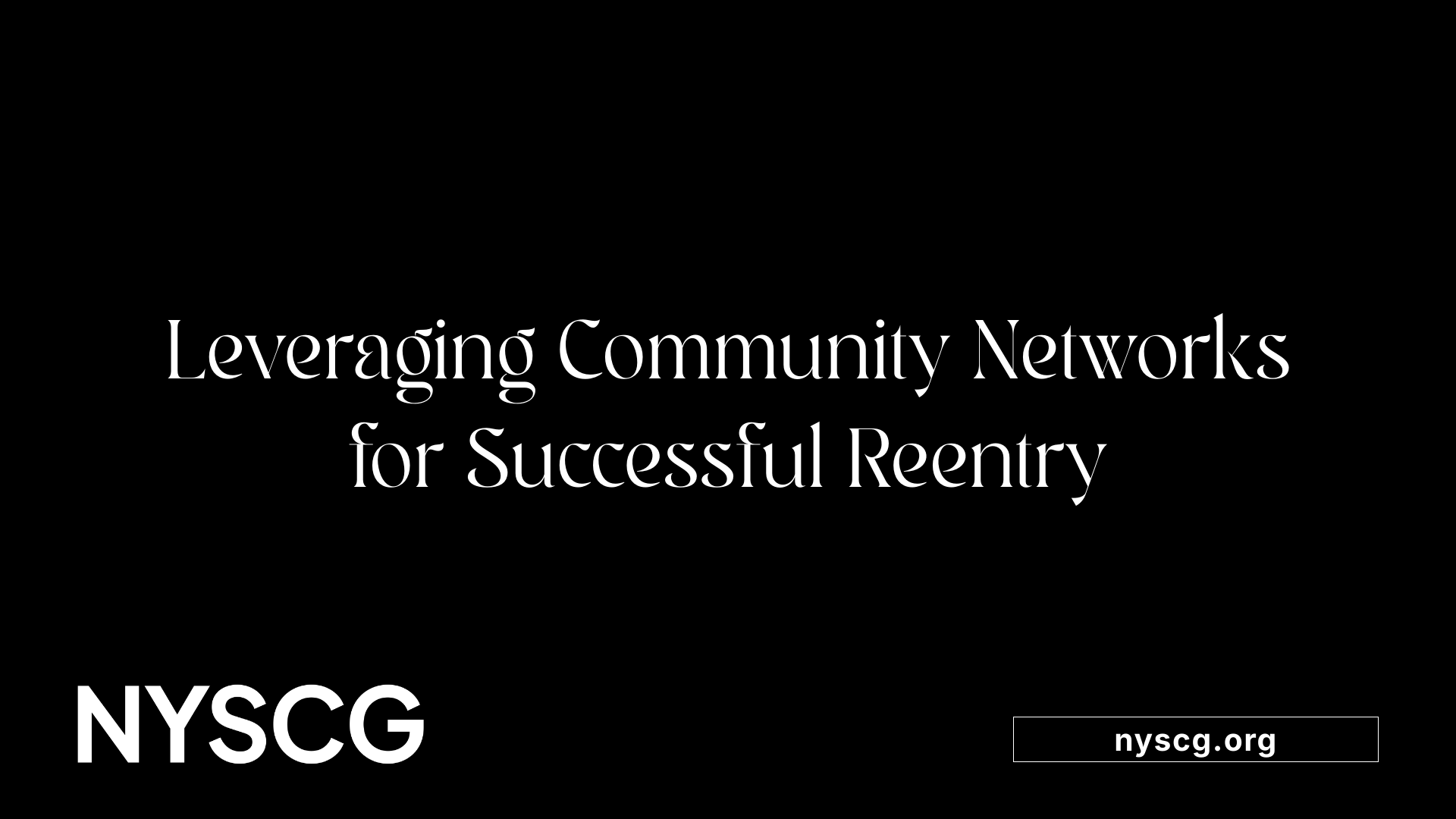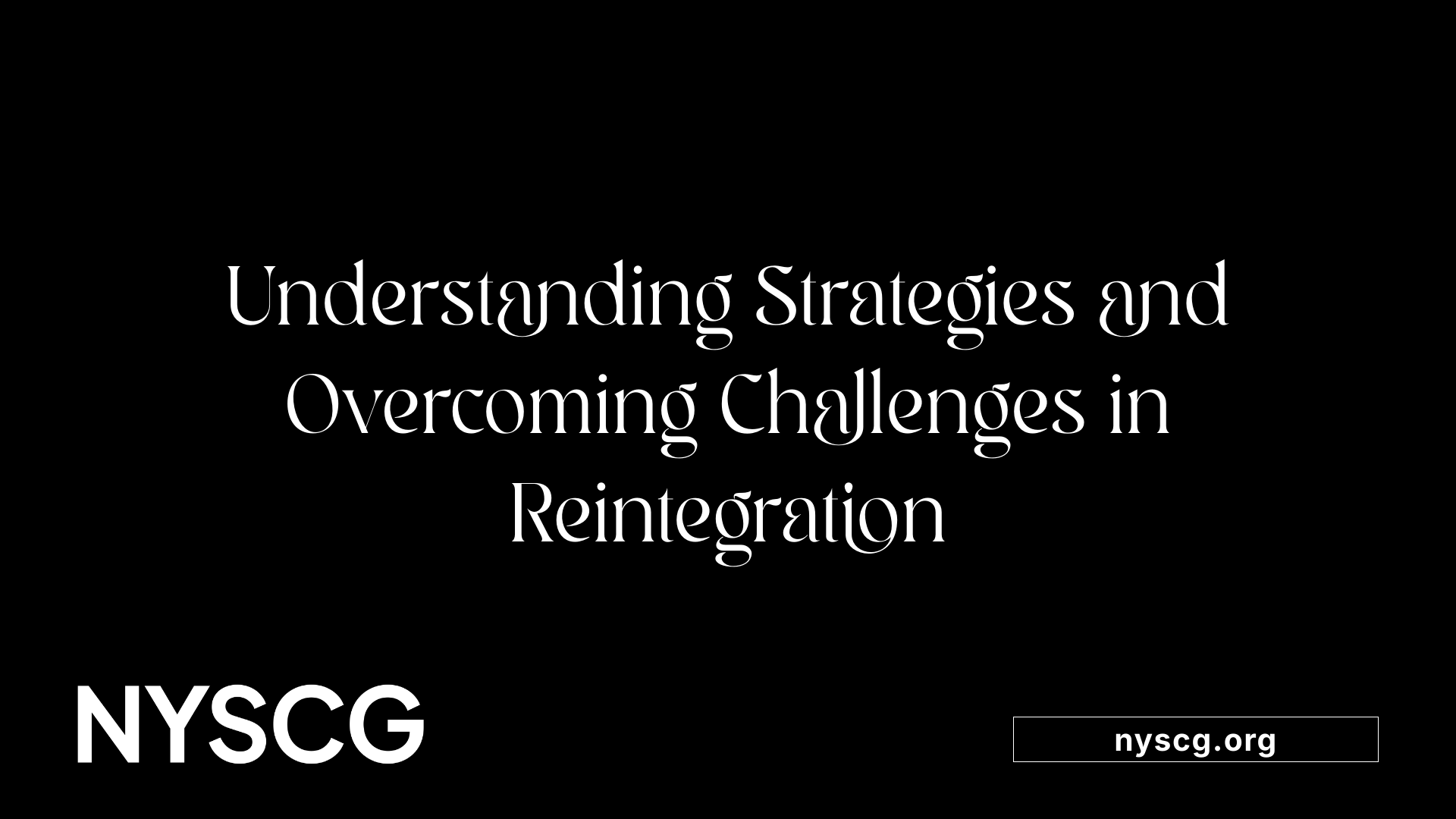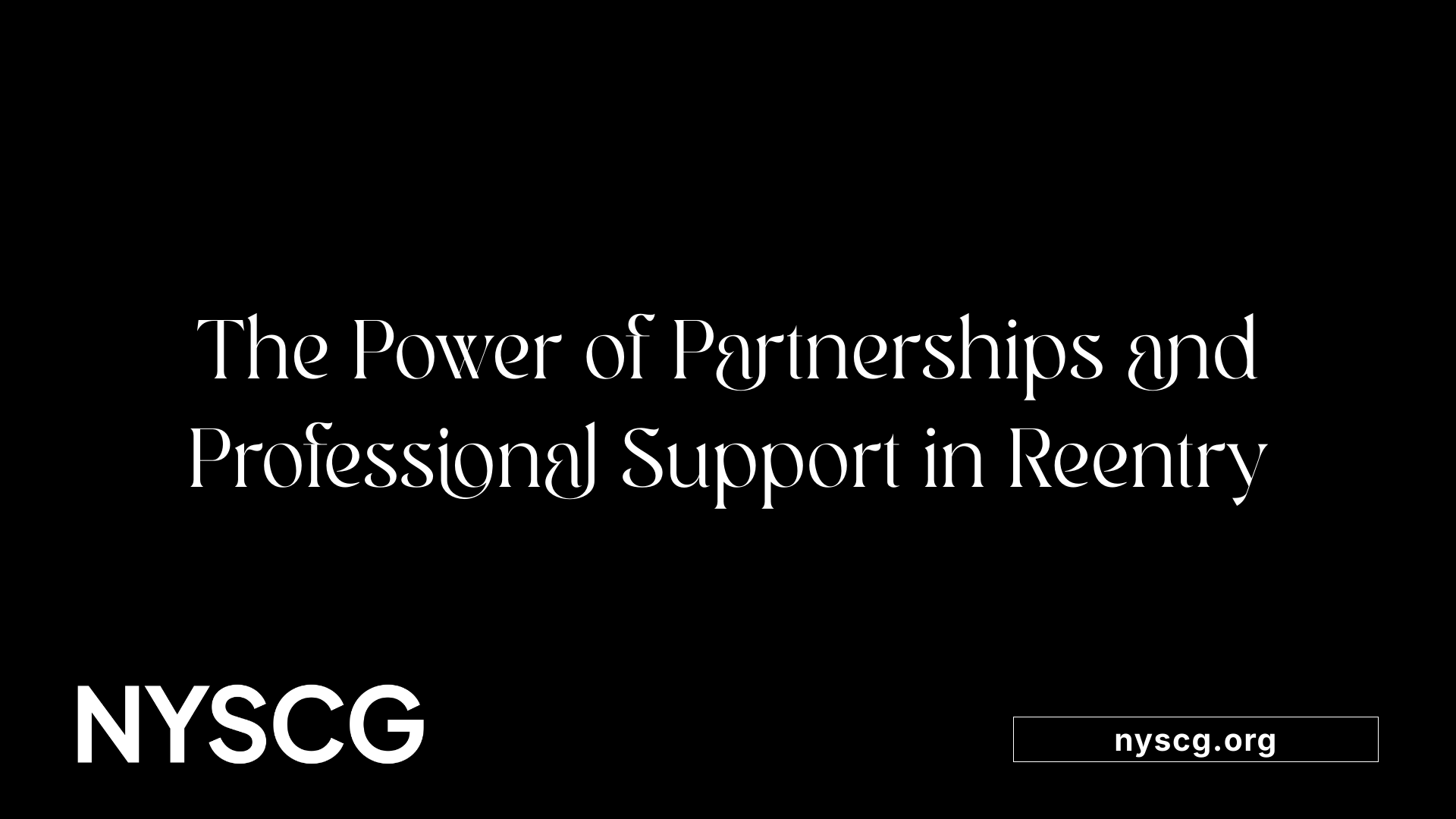Reconnecting Former Inmates With Community Support Networks


Reconnecting former inmates with community support networks is a complex but essential effort aimed at reducing recidivism, enhancing public safety, and fostering personal growth among individuals returning from incarceration. The landscape encompasses a broad array of programs, policies, and partnerships dedicated to facilitating successful transitions into society. This article explores the diverse support models, resources, and strategies that are shaping effective reentry initiatives on local, state, and national levels, highlighting best practices and ongoing challenges.

Supporting individuals as they transition from incarceration back into society requires a comprehensive array of programs and services. These initiatives aim to address employment, housing, mental health, legal barriers, and community integration.
One prominent category includes legal aid organizations like Root & Rebound. They assist with expunging criminal records, navigating legal challenges, and reconnecting with families. Such services help remove obstacles to employment and housing, crucial for stable reintegration.
Record clearing services like Easy Expunctions also play a vital role by streamlining the process for former inmates to have their records expunged or sealed, thereby improving their job prospects and reducing recidivism.
Employment-focused programs such as FreeWorld and Pushing Progress Philly (P3) offer workforce training and job placement opportunities. These programs often provide ongoing support, helping participants gain skills in high-paying industries and ensuring a pathway to economic stability.
Faith-based and mentorship initiatives like JUMPSTART emphasize life skills training, character development, and positive mentorship. These programs foster resilience and personal growth, key factors in successful reentry.
Community collaboration is essential, with agencies like the Office of Reentry Partnerships coordinating efforts among local organizations, employers, and social services to create a supportive environment for reintegration.
At the federal level, the Second Chance Act funds a variety of initiatives targeting homelessness, trauma recovery, and social service barriers. These programs focus on holistic support, ensuring that returning citizens have access to housing, mental health care, and substance use treatment.
By integrating these diverse services, reentry programs aim to reduce recidivism, improve public safety, and help returning citizens rebuild their lives with dignity and purpose.
| Program Type | Focus Area | Example Initiatives | Additional Details |
|---|---|---|---|
| Legal Aid | Record clearance, legal challenges | Root & Rebound, Easy Expunctions | Help with expungement, legal counseling |
| Employment | Job training, placement | FreeWorld, P3 | Focus on high-paying sectors, ongoing support |
| Mentorship & Character Building | Personal development, guidance | JUMPSTART | Life skills, character coaching |
| Federal Funding | Housing, trauma, comprehensive support | Second Chance Act | Holistic services, community safety |
| Community Collaboration | Local reintegration efforts | Office of Reentry Partnerships | Coordinated community resource network |
These programs exemplify a multi-layered approach to supporting former inmates, emphasizing the importance of tailored services and community involvement for successful reentry.
 What resources are available to assist formerly incarcerated individuals with housing, employment, and mental health?
What resources are available to assist formerly incarcerated individuals with housing, employment, and mental health?
Supporting former inmates in their journey back into society involves a diverse array of resources and programs. At the federal level, initiatives like the Second Chance Act and the President's Prisoner Re-entry Initiative (PRI) play vital roles by providing funding and strategic frameworks to enhance reentry services. These policies focus on improving access to housing, employment, and healthcare, aiming to reduce recidivism and facilitate community reintegration.
Community organizations and local agencies also offer critical support. Groups such as the Fortune Society, Root & Rebound, and Prison Fellowship Academy deliver direct services including legal assistance, vocational training, mentorship, and community engagement programs. Volunteers of America, with nearly 50 years of experience, offers extensive housing assistance and job readiness programs, addressing barriers that many formerly incarcerated individuals face.
Housing resources are central to successful reentry. The U.S. Department of Housing and Urban Development (HUD) provides guidance on housing opportunities, and numerous local housing coalitions and nonprofit organizations help secure safe, stable accommodations. These efforts are complemented by initiatives advocating for expanded access to transitional and permanent housing, which are essential in reducing homelessness and stabilizing lives.
Employment support is equally vital. Federal programs operated through American Job Centers connect individuals with job training and placement services, including industry-specific programs such as trucking and coding. Programs like FreeWorld and other vocational initiatives focus on equipping reentrants with skills aligned with local labor markets. These employment resources aim to break down stigma and promote economic independence.
Mental health services are accessible through community clinics and social organizations that specialize in behavioral health care. Policies supporting Medicaid reentry demonstrations enable many returning citizens to access necessary psychiatric and substance use treatment, addressing a common barrier to successful reintegration.
Overall, these coordinated efforts across federal, state, and community levels are designed to create a safety net for formerly incarcerated individuals. By improving access to housing, employment, and mental health care, these resources contribute to safer communities and healthier lives.
| Resource Type | Description | Key Organizations or Programs |
|---|---|---|
| Housing Assistance | Guidance and support for finding stable housing | HUD, Volunteers of America, local housing coalitions |
| Employment Support | Job training, placement, and-upskilling | American Job Centers, FreeWorld, industry-specific programs |
| Mental Health Care | Access to behavioral health and substance use treatment | Community clinics, Medicaid reentry policies, social organizations |
| Federal Initiatives | Policies and funding for reentry success | Second Chance Act, PRI, Reentry Demonstration Projects |
Supporting successful reintegration requires a comprehensive approach that aligns policies, community support, and personal resilience. Access to stable housing, gainful employment, and mental health services remains crucial in ensuring individuals not only return to society but thrive within it.

Community support networks play a vital role in helping former inmates transition smoothly back into society. These networks provide a range of resources, including mentorship programs, peer support groups, and partnerships with local organizations, which are essential in rebuilding lives.
Mentorship programs connect ex-offenders with trained community members who offer guidance, encouragement, and practical assistance. For example, organizations like Prison Fellowship Academy and the Reentry Employment Opportunities initiative train volunteers to serve as mentors, helping individuals develop life skills and fostering a sense of responsibility and belonging.
Peer support groups serve as safe spaces where individuals can share experiences, challenges, and successes. These groups build a sense of community, reduce feelings of isolation, and promote mental health stability. Programs such as the Texas-based Tarrant County Reentry Coalition and Houston Reentry Programs coordinate peer-led activities that address specific needs like employment, housing, and substance abuse recovery.
Community coalitions and partnerships are fundamental in creating a comprehensive support system. Collaborations between faith-based organizations, local governments, nonprofits, and businesses maximize resource sharing and service delivery. Supported by federal initiatives like the Second Chance Act, these efforts include funding for local reentry programs, technical assistance, and policy advocacy aimed at reducing barriers to employment and housing.
Organizations like Root & Rebound, FreeWorld, and the Prison Fellowship Academy focus on providing legal support, job training, faith-based mentoring, and essential life skills. These services aim to empower individuals, promote personal accountability, and facilitate community integration.
Overall, community networks foster dignity and new beginnings by addressing the multifaceted needs of returning citizens. Their efforts contribute not only to individual success but also to safer, healthier communities by reducing the cycle of recidivism and encouraging societal contribution.

Reintegrating former inmates into society is a complex process that requires multifaceted strategies. One primary approach involves providing holistic, personalized support that addresses an individual’s unique needs in areas like housing, employment, healthcare, and mental health services.
Programs such as Volunteers of America’s Community Justice & Re-Entry seek to facilitate this process through tailored services including rehabilitation, halfway houses, work-release, and dispute resolution. These initiatives often employ individualized case management with a focus on restoring dignity and second chances, recognizing that each person’s challenges and strengths vary.
Community engagement is vital. Efforts like peer mentoring and faith-based partnerships help build trust and provide ongoing support, which are crucial during the first critical year post-release. Evidence-based practices, such as cognitive behavioral therapy and relapse prevention, help reduce the likelihood of reoffending.
However, the journey toward successful reintegration faces persistent hurdles. Social stigma remains a significant barrier, often limiting employment opportunities and community acceptance. Housing insecurity is common, with structural barriers like discriminatory policies and lack of affordable options hindering stability.
Health issues—particularly mental health and substance use—are widespread among formerly incarcerated populations. Without adequate treatment and continuity of care, these issues can lead to relapse and reincarceration.
Moreover, systemic problems like limited access to education, racial disparities, and weakened family ties complicate reintegration efforts. Policies that promote criminal justice reform, expand access to health care—including Medicaid—and support educational and employment opportunities are essential.
In summary, supporting successful community reintegration hinges on combining evidence-based rehabilitation programs, policy reforms, and community support systems. Overcoming barriers such as social stigma, health challenges, and structural inequalities requires a comprehensive, individualized approach that promotes recovery, stability, and social participation.

Organizations dedicated to community justice and reentry play a critical part in helping formerly incarcerated individuals reintegrate into society. These groups coordinate services such as legal aid, employment training, housing assistance, mental health treatment, and substance use support.
Partnerships between government agencies, nonprofits, faith-based organizations, and community stakeholders create a network of resources tailored to individual needs. This collaborative approach ensures that services are comprehensive and accessible, addressing barriers like stigma, housing shortages, and employment difficulties.
Professionals including case managers, mental health therapists, peer support specialists, mentors, and vocational trainers are on the front lines of this effort. They provide not only technical support but also emotional resilience, social connection, and motivation.
Funding plays a vital role in maintaining and expanding these efforts. Federal initiatives like the President’s Prisoner Re-entry Initiative, state programs, and private donations secure the resources necessary for large-scale impact.
By working in tandem, these organizations and professionals help promote public safety, uphold dignity, and foster community stability. Their goal is to empower individuals to succeed and contribute positively to their communities.
Community partner collaborations leverage diverse expertise and resources, creating a holistic support system. This reduces recidivism rates and increases the chances of long-term success.
Programs often include mentorship, life skills training, educational opportunities, and access to healthcare—all coordinated by invested professionals.
This integrated effort not only benefits individuals but also strengthens societal bonds, demonstrating how shared commitment and professional support create a more inclusive, resilient community.
| Organization Type | Service Focus | Supporting Role | Examples |
|---|---|---|---|
| Government agencies | Policy, funding, oversight | Facilitate legal, health, and housing services | Department of Justice, Federal Bureau of Prisons |
| Non-profit organizations | Direct service delivery | Offer mentoring, job training, mental health support | Volunteers of America, Network Support Services |
| Faith-based groups | Moral and community support | Provide mentorship, spiritual counseling | Local churches and faith networks |
| Professional support providers | Specialized care | Conduct assessments, therapy, case management | Psychologists, social workers, peer specialists |
Capacity building involves training staff, volunteers, and community partners to improve service delivery. It enhances the skills needed for effective outreach, culturally competent care, and innovative approaches.
Training programs strengthen the ability of professionals to address complex issues like trauma, mental health, and substance use, which are prevalent among formerly incarcerated populations.
By investing in capacity building, organizations ensure sustainability, adapt to evolving needs, and maximize positive outcomes for reentry efforts.
Understanding what truly works in prisoner reentry and community integration is guided by extensive research and data analysis. An influential source is the Urban Institute's 'Returning Home' study, which examines factors that contribute to successful reintegration from multiple perspectives—individuals, families, communities, and policymakers.
Empirical studies show that holistic approaches are most effective. These include mental health and substance abuse treatment, educational opportunities, and job training programs while housing stability and strong social supports are crucial for reducing the chances of reoffending.
Data indicates that participation in prison-initiated programs like vocational training or education improves reintegration success. Community-based mentorship, family involvement, and tailored services are also associated with lower recidivism rates.
Effective policies often involve partnerships between government agencies and local community organizations. These collaborations are adapted to specific community needs and cultural contexts, making interventions more relevant and impactful.
Tracking outcomes through continuous data collection allows policymakers and practitioners to refine strategies over time. This evidence-based approach ensures that resources are directed toward interventions with proven success.
In summary, integrating research findings, outcome metrics, and community-specific data is essential for shaping policies that enhance prison reentry efforts. This ongoing process fosters better support systems, increases public safety, and gives returning citizens a real chance at rebuilding their lives.
Effective reentry and reintegration require the concerted efforts of policymakers, community organizations, service providers, and individuals themselves. By leveraging a broad spectrum of programs, resources, and partnerships, society can support former inmates in rebuilding their lives with dignity, stability, and purpose. Ongoing research and policy reforms remain critical in refining these approaches, ensuring that support systems adapt to evolving needs. Ultimately, fostering community support networks not only benefits returning citizens but also enhances overall community safety and cohesion, emphasizing that successful reentry is a shared societal goal.
All you need is the will to make the world a better place.
New York State chaplain group inc. is a tax deductible organization with a federal tax Id number 92-383-4921